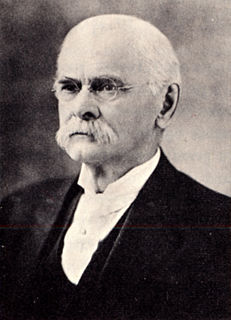A Quote by John Henry Comstock
All life is linked together in such a way that no part of the chain is unimportant. Frequently, upon the action of some of these minute beings depends the material success or failure of a great commonwealth.
Related Quotes
There is no action of man in this life that is not the beginning of so long a chain of consequences as no human providence is high enough to give a man a prospect in the end. And in this chain, there are linked together both pleasing and unpleasing events in such manner as he that will do anything for his pleasure must engage himself to suffer all the pains annexed to it.
One of the commonest mistakes and one of the costliest is thinking that success is due to some genius, some magic - something or other which we do not possess. Success is generally due to holding on, and failure to letting go. You decide to learn a language, study music, take a course of reading, train yourself physically. Will it be success or failure? It depends upon how much pluck and perseverance that word decide contains. The decision that nothing can overrule, the grip that nothing can detach will bring success.
My memory is coming back. It is curious how it comes. Each day, a rush of pieces, loosely connected, unimportant bits, snake through me. They click, click, click into my brain, like links being snapped together. And then they are done. A small chain of memories that fill in one tiny part of my life. They come out of nowhere, and most are not important.
My mother was a continual source of wisdom and great advice...she taught me that there is always a way around a problem-you've just got to find it. Keep trying doors; one will eventually open. She also taught me to accept failure as part and parcel of life. It's not the opposite of success; it's an integral part of success. I talk a lot about learning to become fearless in your approach to life. But fearlessness is not the absence of fear. It's the mastery of fear. It's all about getting up one more time than you fall down.
If success were easy, then it would not necessarily be true success. Some of history's most successful people learned to cope with failure as a natural offshoot of the experimental and creative process and often learned more from their failures than their successes. By taking the attitude that failure is merely a detour on the way to our destination, hope can blossom into success.
































